
Central Asia Launches Regional Urban Resilience Coalition
Central Asia Launches Regional Urban Resilience Coalition
Tashkent, Uzbekistan (UzDaily.com) — In response to increasing vulnerability to natural disasters and climate risks, a Regional Dialogue on Urban Resilience was recently held in Dushanbe, marking a significant step toward promoting sustainable urban development across Central Asia, according to the UNDP Uzbekistan Office.
The event was organized by the United Nations Development Programme (UNDP) in partnership with the Center for Emergency Situations and Disaster Risk Reduction (CESDRR), the UN Office for Disaster Risk Reduction (UNDRR), and supported by the Government of Tajikistan. Representatives from national authorities, municipalities, and experts from all five Central Asian countries participated, along with international development partners.
The dialogue was part of the regional UNDP project “Enhancing Urban Resilience to Disasters and Climate Change in Central Asia”, funded by the Government of Japan. The project is being implemented in pilot cities: Petropavlovsk (Kazakhstan), Osh (Kyrgyzstan), Dushanbe (Tajikistan), Ashgabat (Turkmenistan), and Namangan (Uzbekistan). Based on the Sendai Framework and the Paris Agreement, the project helps countries integrate disaster and climate risk considerations into development strategies and strengthen local communities’ resilience.
A key outcome of the dialogue was the creation of the Regional Urban Resilience Coalition (RURC), formalized through a Joint Declaration by representatives of the pilot cities. The coalition aims to enhance intercity collaboration, promote climate-resilient urban development, and engage in the global Making Cities Resilient 2030 (MCR2030) campaign.
City leaders from Dushanbe, Petropavlovsk, Osh, Ashgabat, and Namangan shared experiences and plans for building sustainable cities of the future. Discussions highlighted a variety of approaches in the region, from infrastructure modernization and risk assessment to community engagement and inclusive urban planning.
"We are pleased that Namangan joins Osh, Dushanbe, Ashgabat, and Petropavlovsk in the Central Asia Urban Resilience Coalition. We fully support this initiative," said Shukhrat Maksumov, Head of the Ecology Department of Namangan Region, Uzbekistan.
Participants explored regional and international initiatives for urban resilience, including Japan’s comprehensive urban planning approach and GIZ programs supporting urban development in Central Asia. UNDP presented an integrated approach to urban resilience applied in pilot cities, emphasizing the incorporation of disaster risk reduction and climate adaptation principles into urban planning. The initiative complements other programs, including MCR2030, Mayors for Economic Growth (M4EG), and GAP Fund, providing Central Asian cities with a broad set of tools to strengthen resilience.
Sessions focused on city experiences provided a platform for exchanging technical achievements and lessons learned. Pilot cities shared progress in risk assessment and planning, underscoring the value of peer learning and regional solidarity in addressing complex urban challenges.
On the second day, technical discussions were held among UNDP country offices, national experts, and city representatives. Participants reviewed preliminary field research results, explored integration of resilience principles into urban planning, and discussed potential applications of artificial intelligence for data-driven decision-making.
The Regional Dialogue on Urban Resilience supports the Paris Agreement, the Sendai Framework for Disaster Risk Reduction (2015–2030), the UN 2030 Sustainable Development Agenda, and the Central Asia Regional Cooperation Strategy on Disaster Risk Reduction (2022–2030). It reaffirmed the commitment of regional governments and partners to building a resilient urban future for Central Asia.